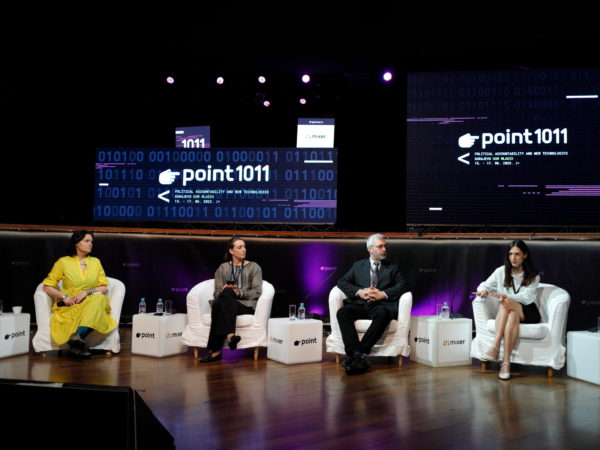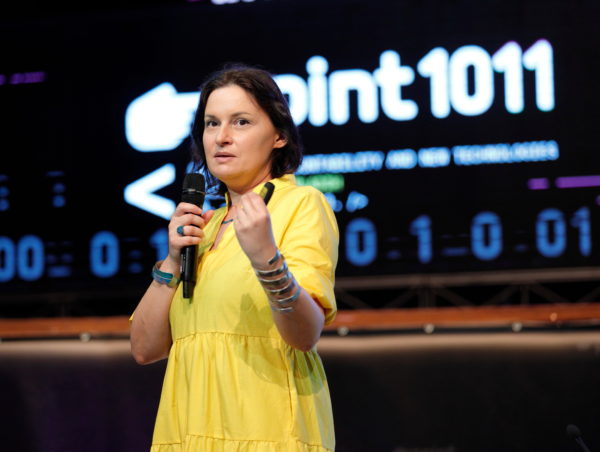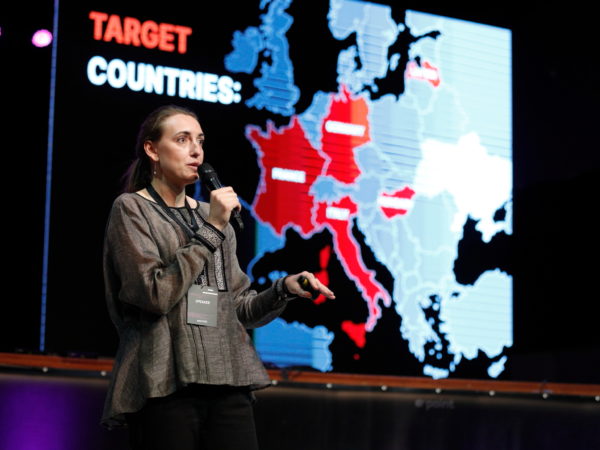How to spin an invasion? The mechanisms and goals of Russian propaganda
Speakers at the opening panel of the POINT 1011 Conference discussed the propaganda narratives on the war in Ukraine, the ways they emerged or were amplified, and the efforts to map the flow of such disinformation.

Photo: Vanja Čerimagić
The eleventh POINT Conference (Political responsibility and new technologies) opened in the Youth Centre (“Dom mladih”) in Sarajevo. The conference was opened by Darko Brkan, executive director of the Citizens Association (CA) “Why not”. For the first time, the conference offers a program that was made with another organization, said Brkan, referring to the partnership between the organizer CA “Why not” and the Mixer organization from Poland, which took part in organising the conference this year.
This year’s conference is called POINT 1011, which is the binary form of the number 11, and refers to the topics of the conference that will deal with dilemmas between analog and digital concepts, said Brkan.
The POINT 1011 began with a panel discussion on disinformation about the Russian invasion of Ukraine. Disinformation and propaganda narratives about this war were at the center of the discussion joined by Olga Myrovych from Lviv Media Forum (Ukraine), Nikola Petrović from ISAC Fund (Serbia) and Eto Buziashvili from Atlantic Council (Georgia). The panel was led by Tijana Cvjetićanin from CA “Why not” (BiH), which in the introduction presented a series of analyses on disinformation narratives about the Russian invasion, published by the fact-checking platform Raskrinkavanje.

Photo: Vanja Čerimagić
Cvjetićanin, who is also an editor at Raskrinkavanje, said that based on analyzed disinformation in BiH and the region in the period between January 2021 and October 2022, this platform found that one-third of the analyzed content was related to the war in Ukraine. Based on the themes in such content, six dominant disinformation narratives about the war in Ukraine were identified and addressed in six analyses published by Raskrinkavanje.
Before the panel discussion, Filip Stojanovski from Metamorphosis Foundation (North Macedonia) also presented the goals and results of the Western Balkans Anti-Disinformation Hub project, an initiative that maps the flow of disinformation to expose malign foreign influences in the Western Balkans region.
In the introductory part of the panel, Myrovich spoke about the research of her organization, (In)Visible Propaganda, which dealt with disinformation messages about the war in Ukraine in credible media in five EU countries. Referring to the seemingly paradoxical situation that credible media in democratic countries sometimes published disinformation or propaganda information, she said that professional media standards may be one of the reasons for that, or rather the standard according to which a media report should have “both sides of the story”, in this case, official Russian sources as well, which are often sources of disinformation. She noted that propaganda from Russia was “more successful” in EU countries whose governments “lean” towards supporting narratives that justify the invasion.

Photo: Vanja Čerimagić
Buziashvili compared the propaganda narratives that were spread in 2008, during the war in Georgia, with the narratives from 2014 and 2022 about the war in Ukraine. She noted that the pro-Russian narrative about Georgia as a threat to Russia, which was used to justify the 2008 war, was “copied” in 2014 and amplified in 2021 and 2022, before and during the invasion of Ukraine. She stressed that as part of this narrative, there were claims about the threat of weapons of mass destruction (eng. WMD) that allegedly came from Ukraine. This refers to claims about “dirty bombs” that Ukraine will use to blame Russia for the war, or about biological laboratories where pathogens such as Covid-19 or viruses that “target Russian DNA” are produced.
Petrović said that Serbia is fertile ground for pro-Russian narratives because of the political and economic ties between the two countries. He described the situation in which the Russian media “offer” free media content and the media in Serbia republish it without critical analysis. The mechanism is simple, he said, we allow it and they use that.

Photo: Vanja Čerimagić
Buziashvili said that Russian propaganda has two general goals. One is “domestic”, an effort to prolong the domestic support for the war in Ukraine. The second is “external”, the effort to justify the war. In African countries, propaganda focuses on “whataboutism”, i.e. highlighting the colonial “sins” of Western countries in Africa. In Latin America, she noted, Russian state media are deepening their influence by launching Spanish-language editions.
Author: Rašid Krupalija